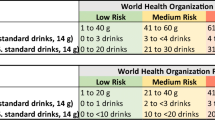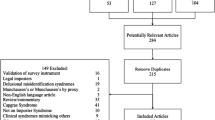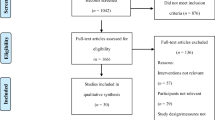Abstract
Alcohol misuse is related to various issues in the workplace context, such as workplace accidents, absenteeism, conflicts, and stress. This work aims to assess the effects of brief intervention (BI) on alcohol-related issues use in the university workplace environment. The method consisted of a controlled, randomized clinical trial with an experimental design, quantitative. Initially, 1011 workers answered the instruments, 143 individuals who were classified as risk users participated in the final sample of the randomized clinical trial. Individuals were randomized to receive feedback and brochures (feedback, n = 68) or feedback, brochures, and BI (BI, n = 75). The results show that, in the intragroup analysis, there was a difference in all measures for the reduction of alcohol consumption at 3 months. In addition, the IB group has a greater tendency to reduce alcohol use in most of the questions analyzed, although the “feedback” group also presented results regarding a reduction in alcohol consumption in the short-term. Performing a BI in the university workplace environment showed to be effective and its results are comparable to previously studied contexts. Registered on the Registro Brasileiro de Ensaios Clínicos (REBEC) (# RBR-2fvdg2), date 14/06/2016.

Similar content being viewed by others
References
L Alfred M Limmer S Cartwright 2021 An integrative literature review exploring the impact of alcohol workplace policies International Journal of Workplace Health Management 14 1 8110 https://doi.org/10.1108/IJWHM-10-2019-0130
RAD Amaral A Malbergier 2004 Evaluation of a screening test for alcohol-related problems (CAGE) among employees of the Campus of the University of São Paulo Rev. Bras. Psiq. 26 3 156 163 https://doi.org/10.1590/S1516-44462004000300005
Babor T, Higgins-Biddle JC, 2003. Intervenções breves: para o uso de risco e nocivo de álcool - manual para uso em atenção primária. Ribeirão Preto: PAI-PAD. https://apps.who.int/iris/bitstream/handle/10665/67210/WHO_MSD_MSB_01.6b_por.pdf?sequence=2&isAllowed=y. Accessed on 12 Aug 2020
Babor T, Higgins-Biddle JC, Saunders JB, Monteiro MG, 2006. AUDIT - Teste de Identificação de Problemas Relacionados ao Uso de Álcool: Roteiro para Uso em Atenção Primária. Ribeirão Preto: PAI-PAD. http://www.aberta.senad.gov.br/medias/original/201704/20170424-095653-001.pdf. Accessed on 12 Aug 2020
S Baby H Singh R Singh S Dixit A Chail A Dubey 2019 Outcome of a “modified brief intervention” program delivered at work place for a population with hazardous alcohol use Industrial Psychiatry Journal 28 2 294 https://doi.org/10.4103/ipj.ipj_95_20
Beyer, F. R., Campbell, F., Bertholet, N., Daeppen, J. B., Saunders, J. B., Pienaar, E. D., ... & Kaner, E. F. S. (2019). The Cochrane 2018 review on brief interventions in primary care for hazardous and harmful alcohol consumption: A distillation for clinicians and policy makers. Alcohol and alcoholism, 54(4), 417-427. https://doi.org/10.1093/alcalc/agz035
I Boutron D Moher DG Altman KF Schulz P Ravaud 2008 Extending the CONSORT statement to randomized trials of nonpharmacologic treatment: explanation and elaboration Ann Intern Med 148 4 295 309 https://doi.org/10.7326/0003-4819-148-4-200802190-00008
RMR Brites AMM Abreu 2014 Padrão de consumo de bebidas alcoólicas entre os trabalhadores e perfil socioeconômico Acta Paul Enferm 27 2 93 99 https://doi.org/10.1590/1982-0194201400018
Cebrid, 2014. Panfletos sobre o uso de álcool. Centro Brasileiro de Informações sobre Drogas Psicotrópicas. São Paulo, SP. Disponível em. http://www.cebrid.epm.br/folhetos/folhetos.htm. Accessed on 12 Jun 2019
FW Chi CM Weisner JR Mertens TB Ross SA Sterling 2017 Alcohol brief intervention in primary care: Blood pressure outcomes in hypertensive patients J Subst Abuse Treat 77 45 51 https://pubmed.ncbi.nlm.nih.gov/28476271/
TVD Conceição FA Gomes PL Tauil TT Rosa 2006 Valores de pressão arterial e suas associações com fatores de risco cardiovasculares em servidores da Universidade de Brasília Arquivos Brasileiros De Cardiologia 86 1 26 31 https://doi.org/10.1590/S0066-782X2006000100005
Donovan, DM, Bogenschutz MP, Perl H, Forcehimes A, Adinoff B, Mandler R, Oden N, & Walker R, 2012 Study design to examine the potential role of assessment reactivity in the Screening, Motivational Assessment, Referral, and Treatment in Emergency Departments (SMART-ED) protocol. Addict Sci Clin Pract 2012, 7(16):1-11. https://doi.org/10.1186/1940-0640-7-16
LR Fernandes FAB Colugnati LMA Sartes 2015 Development and evaluation of psychometric properties of the Brazilian version of Addiction Severity Index 6 (ASI-6) Light Jornal Brasileiro De Psiquiatria 64 2 132 139 https://doi.org/10.1590/0047-2085000000068
Ferreira, M. L., (2019). A Intervenção Breve (IB) para problemas relacionados ao uso de álcool em servidores universitários: uma análise quantitativa e qualitativa. (Tese de doutorado). Universidade Federal de Juiz de Fora, Programa de Pós Graduação em Psicologia, Juiz de Fora. https://www.ufjf.br/ppgpsicologia/apresentacao-do-curso/dissertacoes/dissertacoes-defendidas/. Accessed on 13 Aug 2020
MPA Fleck 1999 Desenvolvimento da versão em português do instrumento de avaliação de qualidade de vida OMS (WHOQOL-100) Rev Bras Psiq São Paulo-SP 21 1 34 9 https://doi.org/10.1590/S1516-44461999000100006
RS Gavin E Reisdorfer ECDS Gherardi-Donato LND Reis ACG Zanetti 2015 Association between depression, stress, anxiety and alcohol use among civil servants SMAD 11 1 02 09 https://doi.org/10.11606/issn.1806-6976.v11i1p2-9
Grucza, R. A., Sher, K. J., Kerr, W. C., Krauss, M. J., Lui, C. K., McDowell, Y. E., ... & Bierut, L. J., 2018. Trends in adult alcohol use and binge drinking in the early 21st century united states: A meta‐analysis of six national survey series. Alcohol Clin Exp Res. https://doi.org/10.1111/acer.13859
Hermansson, U., Helander, A., Brandt, L., Huss, A., Rönnberg, S ., 2010. Screening and brief intervention for risky alcohol consumption in the workplace: Results of a 1-year randomized controlled study Alcohol & Alcoholism 45(3):252-257. https://doi.org/10.1093/alcalc/agq021
International Labor Organization (ILO), 2008. Management of alcohol and drug related issues in the workplace. International Labor Bureau. Geneva. http://www.ilo.org/wcmsp5/groups/public/---ed_protect/---protrav/---safework/documents/normativeinstrument/wcms_218608.pdf. Accessed on 13 Aug 2020
Kaner, E. F., Beyer, F. R., Muirhead, C., Campbell, F., Pienaar, E. D., Bertholet, N., ... & Burnand, B. (2018). Effectiveness of brief alcohol interventions in primary care populations. Cochrane database of systematic reviews, (2). https://doi.org/10.1002/14651858.CD004148.pub4
Laranjeira, R., Madruga, C. S., Pinsky, I., Caetano, R., & Mitsuhiro, S. S., 014. II levantamento nacional de álcool e drogas (LENAD), 2012. São Paulo: Instituto Nacional de Ciência e Tecnologia para Políticas Públicas de Álcool e Outras Drogas/Universidade Federal de São Paulo. https://inpad.org.br/wp-content/uploads/2014/03/Lenad-II-Relat%C3%B3rio.pdf. Accessed on 12 Jun 2019
Lock, C. A., Kaner, E., Heather, N., Doughty, J., Crawshaw, A., McNamee, P.,… & Pearson, P., 2006. Effectiveness of nurse-led brief alcohol intervention: A cluster randomized controlled trial. J Adv Nurs, 54 (4), 426-439. https://doi.org/10.1111/j.1365-2648.2006.03836.x
P Mathurin P Deltenre 2009 Effect on binge drinking on the liver: An alarming public health issue? Gut https://doi.org/10.1136/gut.2007.145573
McCambridge, J., & Saitz, R., 2017. Rethinking brief interventions for alcohol in general practice. Bmj. https://doi.org/10.1136/bmj.j116
TL McPherson E Goplerud D Derr J Mickenberg S Courtemanche 2010 Telephonic screening and brief intervention for alcohol misuse among workers contacting the employee assistance program: A feasibility study Drug and Alcohol Review 29 641 646 https://doi.org/10.1111/j.1465-3362.2010.00249.x
De Micheli e Formigoni, 2006. Sistema para detecção do Uso abusivo e dependência de substâncias Psicoativas: Encaminhamento, IB, Reinserção social e Acompanhamento. SUPERA. SENAD. Brasília, 1ª edição. Disponível em. https://www.supera.org.br/. Accessed on 12 Jun 2019
Miller, W. & Rollnick, S., 2001. A Entrevista Motivacional. Porto Alegre: Artmed Editora.
Nelson, M. and Lenton, S., 2015. West Australian Trends in Ecstasy and related Drugs Reporting System (EDRS). Australian Drug Trend Series No. 142, Sydney: National Drug and Alcohol Research Centre, University of New South Wales. https://ndarc.med.unsw.edu.au/
P Nilsen E Kaner TF Babor 2008 Brief intervention, three decades on Nordic Studies on Alcohol and Drugs 25 6 453 468 https://doi.org/10.1177/145507250802500608
A O'Donnell 2014 The impact of brief alcohol interventions in primary healthcare: A systematic review of reviews Alcohol and Alcoholism 49 1 66 78 https://doi.org/10.1093/alcalc/agt170
CMB Ortiz MHP Marziale 2010 El consumo de alcohol en personal administrativo y de servicios de una universidad del Ecuador Revista Latino-Americana De Enfermagem 18 487 495 https://doi.org/10.1590/S0104-11692010000700002
S Pengpid K Peltzer L Skaal H Heever Van der 2013 Screening and brief interventions for hazardous and harmful alcohol use among hospital outpatients in South Africa: Results from a randomized controlled trial BMC Public Health 13 1 644 https://doi.org/10.1186/1471-2458-13-644
MO Pereira BM Anginoni NC Ferreira MAF Oliveira D Vargas LA Colvero 2013 Efetividade da IB para o uso abusivo de álcool na atenção primária: Revisão sistemática Revista Brasileira De Enfermagem 66 3 420 428 https://doi.org/10.1590/S0034-71672013000300018
Rolles, S., Murkin, G., Powell, M., Kushlick, D., Saunter, N., & Slater, J., 2016. The alternative world drug report. Transform Drug Policy Foundation.
R Saitz 2014 Screening and brief intervention for unhealthy drug use: Little or no efficacy Front Psychiatry 5 121 https://doi.org/10.3389/fpsyt.2014.00121/full
M Velasquez G Maurer C Crouch CC DiClemente 2001 Group treatment for substance abuse: A stages-of- change therapy manual Guilford
G Webb A Shakeshaft R Sanson-Fisher A Havard 2009 A systematic review of work-place interventions for alcohol-related problems Addiction 104 365 377 https://doi.org/10.1111/j.1360-0443.2008.02472.x
EP Whitlock 2004 Behavioral counseling interventions in primary care to reduce risky/harmful alcohol use by adults: A summary of the evidence for the US Preventive Services Task Force Ann Intern Med, Philadelphia 140 7 557 568 https://doi.org/10.7326/0003-4819-140-7-200404060-00017
WHO, 2011. Global status report on alcohol and health. Geneva: Department of Mental Health and Substance Abuse. https://www.who.int/substance_abuse/publications/global_alcohol_report/msbgsruprofiles.pdf. Accessed on 12 Jun 2019
Acknowledgements
We thank UFJF for providing the Bolsa de Iniciação Científica (BIC) scholarships, Capes for providing the doctoral scholarship and international study scholarship PSDE19, and Programa de Extensão Universitária MEC/SESu (Proext 2015) for providing outreach scholarships.
Funding
This work was supported by the Fundação de Amparo à Pesquisa do Estado de Minas Gerais (Fapemig) [grant number APQ-01918–15]; the Programa de Extensão Universitária MEC/SESu [Proext 2015]; Coordenação de Aperfeiçoamento de Pessoal de Nível Superior for providing the doctoral scholarship and international study scholarship PSDE19.
Author information
Authors and Affiliations
Contributions
The authors Maira Leon Ferreira and Laisa Marcorela Andreoli Sartes (1) made substantial contributions to the conception or design of the work; or the acquisition, analysis, or interpretation of data; (2) drafted the work or revised it critically for important intellectual content; (3) approved the version to be published; and (4) agree to be accountable for all aspects of the work in ensuring that questions related to the accuracy or integrity of any part of the work are appropriately investigated and resolved. Maira Leon Ferreira was responsible for developing the main idea of the study, operationalizing the data collection, analyzing the data, and writing the final article. Laisa Marcorela Andreoli Sartes was responsible for supervising data analysis, providing guidance on statistical analysis, providing guidance on making tables and figures, conducting training for data collection, suggesting literature in the area, and reviewing the translation of the manuscript into English.
Corresponding author
Ethics declarations
Ethics Approval
All procedures followed were in accordance with the ethical standards of the responsible committee on human experimentation (institutional and national) and with the Helsinki Declaration of 1975, as revised in 2000 (5). The approval opinion was issued by the Human Research Ethics Committee of the Federal University of Juiz de Fora, Brazil, protocol: (Technical Report 1,164,078).
Informed Consent
Informed consent was obtained from all patients for being included in the study.
Conflict of Interest
The authors declare no competing interests.
Additional information
Publisher's Note
Springer Nature remains neutral with regard to jurisdictional claims in published maps and institutional affiliations.
Rights and permissions
About this article
Cite this article
Ferreira, M.L., Sartes, L.M.A. Effectiveness of Brief Intervention for Alcohol Use: a Randomized Trial. Int J Ment Health Addiction 21, 2084–2100 (2023). https://doi.org/10.1007/s11469-021-00709-6
Accepted:
Published:
Issue Date:
DOI: https://doi.org/10.1007/s11469-021-00709-6




